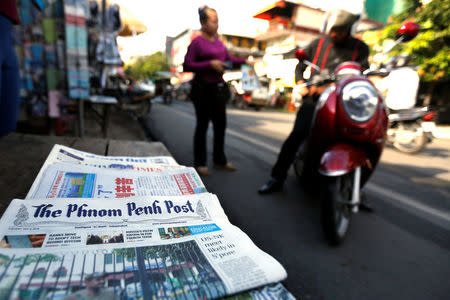Foreign journalists quit Cambodia paper in protest at perceived interference
By Prak Chan Thul
(Reuters) - As many as 13 foreign journalists resigned from Cambodia's Phnom Penh Post newspaper this week in protest at what they called editorial interference following its sale to a Malaysian businessman.
The sale of the English-language newspaper, announced at the weekend, came amid increasing concern about a crackdown by long-serving Prime Minister Hun Sen against his critics ahead of a general election set for July 29.
Another English-language paper, the Cambodia Daily, shut down last year after the government gave it a month to settle a $6.3 million tax bill. A third English-language paper, the Khmer Times, is owned by another Malaysian and takes a pro-government stance.
The resignations on Monday and Tuesday followed the announcement of the sale of the paper by Australian mining magnate Bill Clough, who has owned it since 2008, to Malaysian investor Sivakumar Ganapathy, whose public relations firm lists Hun Sen as a client.
The resignations of as many as 13 editors and reporters leave no foreign journalists at the paper, which has built a reputation for independent reporting that can be critical of the government on issues such as illegal logging and corruption.
"We did what we felt we had to do to maintain our journalistic integrity," one of the journalists who resigned, Andrew Nachemson, an American, told Reuters.
"It was a difficult and very personal decision, and I wish all my Cambodian colleagues the best."
Ganapathy did not immediately respond to telephone calls from Reuters on Wednesday to seek comment.
Representatives of Ganapathy on Monday ordered the removal from the newspaper's website of an article critical of the sale, several reporters said.
The incident led to the firing of the editor-in-chief, Kay Kimsong, a Cambodian, after he refused to take down the article, Kimsong told Reuters.
In a statement on Monday, Ganapathy said the article, since removed, was a "disgrace and an insult to the independence claim of the newspaper".
International rights groups and journalism bodies have said they fear the sale of the paper, founded in 1992, could signal the end of independent media in Cambodia ahead of the July vote.
"This is just the latest in a series of attacks which have devastated Cambodia's media landscape since mid-2017," a group of more than 70 Cambodian civil society groups said in a joint statement on Wednesday.
"The Phnom Penh Post was Cambodia's last remaining independent English-Khmer language daily, and its change of ownership raises serious questions about the paper's continued independence."
The Foreign Correspondents' Club of Thailand said it was "dismayed".
"Such tactics obviously jeopardise any hope of maintaining a moderately free press in Cambodia, but should also be of grave concern to all investors in the country who may find themselves on the wrong side of officialdom or vested interests with no viable legal recourse," it said.
Ganapathy is the managing director of Asia Public Relations Consultants Sdn Bhd, based in Malaysia, whose website referred to "Cambodia and Hun Sen's entry into the government seat" as one of its projects.
When a Reuters journalist visited the firm's office in Kuala Lumpur on Tuesday, the door was locked and nobody responded to rings on the doorbell.
Phone calls to a representative for the firm seeking comment went unanswered on Wednesday.
(Additional reporting by Rozanna Latiff in Kuala Lumpur; Writing by Amy Sawitta Lefevre; Editing by Clarence Fernandez and Nick Macfie)




